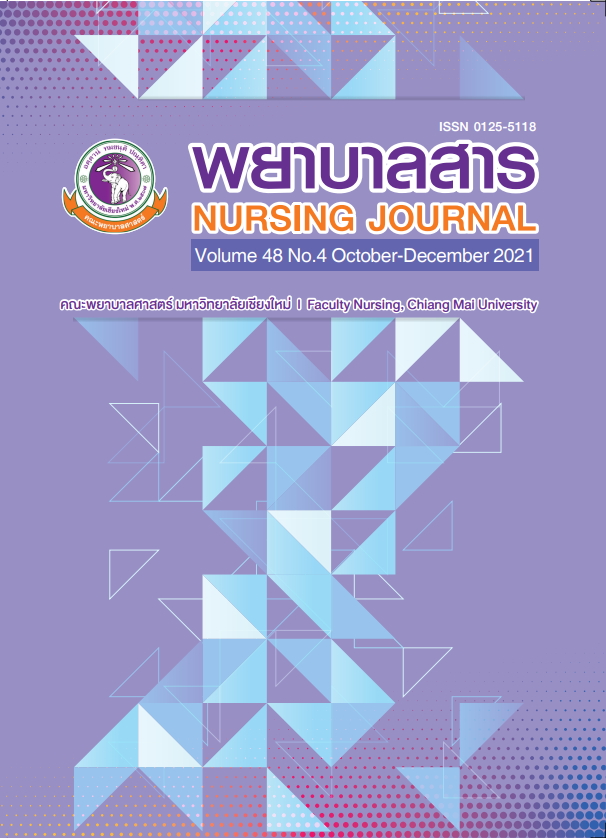Factors Related to Paternal Health Literacy Among Expectant Fathers
Keywords:
Social support, Paternal health literacy, Anxiety, Expectant fathersAbstract
Paternal health literacy among expectant fathers is essential for the wellness of the expectant father, the pregnant wife, and the fetus. The purpose of this descriptive correlational research study was to explore education, income, anxiety, social support, and paternal health literacy among expectant fathers. The subjects consisted of 105 expectant fathers who took their pregnant wives to the antenatal care unit at Maharaj Nakorn Chiang Mai Hospital and Health Promotion Center Region 1 Chiang Mai from March 2021 to June 2021. The research instruments were the Paternal Health Literacy Questionnaire, the State Anxiety Inventory [STAI] form Y-1, and the Social Support Questionnaire. Descriptive statistics, Eta correlation, Pearson's product moment correlation and Spearman rank correlation coefficient were used to analyze the data. The results of the study revealed that 1. Most participants (94.29%) had high paternal health literacy. The mean score was 407.14 (SD = 37.58). 2. Anxiety had a negative correlation with paternal health literacy (r = -.387, p < .001), while social support had a positive correlation with paternal health literacy (r = .464, p < .001). 3. Education and income were not correlated with paternal health literacy. The findings from this study can be used as baseline data to promote paternal health literacy among expectant fathers by providing social support and reducing the anxiety of expectant fathers to maintain wellness for them, their pregnant wife, and the fetus.
References
Davidson, M.R., London, M., & Ladewig, P. A. (2019). Old’ s maternal - newborn nursing & Women’ s Health across the lifespan (11th ed.). New Jersey: Pearson Prentice Hall.
Faul, F., Erdfelder, E., Buchner, A., & Lang, A. G. (2009). Statistical power analyses using G* Power 3.1: Tests for correlation and regression analyses. Behavior Research Methods, 41(4), 1149-1160. doi.org/10.3758/BRM.41.4.1149
Hoffman, J. (2011). Father factors: What social science research tells us about fathers and how to work with them. Retrieved from https://www.fatherhood.gov/research-and-resources/father-factors-what-social-science-research-tells-us-about-fathe rs-and-how-work
House, J.S. (1981). Work stress and social support. Mass: Addison - Wesley.
Intarakamhang, U. (2017). Health literacy: Scale and development. Bangkok: Sukhumvit Printing. (in Thai)
Knapp, C., Madden, V., Wang, H., Sloyer, P., & Shenkman, E. (2011). Internet use and Healthliteracy of low-income parents whose children have special health care needs. Journal of Medical Internet Research, 13(3), e1697. doi.org/10.2196/jmir.1697
Lu, M. C., Jones, L., Bond, M. J., Wright, K., Pumpuang, M., Maidenberg, M., . . . Rowley, D. L. (2010). Where is the F in MCH? Father involvement in African American families. Ethnicity & Disease, 20, S2-49-S2-61.
Manganello, J. A. (2008). Health literacy and adolescents: A framework and agenda for future research. Health Education Research, 23(5), 840-847. doi.org/10.1080/10810730.2010.499987
Nuntapong, P., Sansiriphun, N., & Baosoung, C. (2017). Factors related to father involvement among first time expectant fathers. Nursing Journal, 44(Supplement (1)), 96-106. (in Thai)
Nutbeam, D. (2008). The evolving concept of health literacy. Social Science & Medicine, 67(12), 2072-2078. doi.org/10.1016/j.socscimed.2008.09.050
Peplau, H. E. (1989). Interpersonal theory in nursing practice: Selected works of Hildegard E.Peplau: Philadelphia: Springer Publishing.
Plantin, L., Olykoya, A., & Ny, P. (2011). Positive health outcomes of fathers’ involvement in pregnancy and childbirth paternal support: A scope study literature review. Fathering, 9(1),87-102. doi:10.3149/fth.0901.87
Prompeng, N. (2018). The role of nurse-midwife on supporting paternal role development in a first-time father. Journal of The Royal Thai Army Nurses, 19(2), 63-69. (in Thai)
Ratzan, S. C., & Parker, R. M. (2000). Health literacy. USA: Department of Health and Human Services. Retrieved from https://webharvest.gov/peth04/20041105213541/http://www.nlm.nih.gov/pubs/cbm/hliteracy.pdf
Sansiriphun, N. (2009). Becoming a first-time father among Thais (Doctoral dissertation). Chiang Mai University, Chiang Mai, Thailand. University, Thailand.
Sansiriphun, N., Kantaruksa, K., Klunklin, A., Baosuang, C., & Jordan, P. (2010). Thai men becoming a first time father. Nursing & Health Sciences, 12(4), 403-409. doi.org/10.1111/j.1442-2018.2010.00549.x
Shives, L. R. (2008). Basic concepts of psychiatric-mental health nursing (7thed.), Philadelphia: Lippincott Williams & Wilkins.
Sørensen, K. (2019). Paternal health literacy. Retrieved from https://www.linkedin.com/pulse/paternal-health-literacy-kristine- sørensen/
Sørensen, K., Van den Broucke, S., Fullam, J., Doyle, G., Pelikan, J., Slonska, Z., & Brand, H. (2012). Health literacy and public health: A systematic review and integration of definitions and models. BMC Public Health, 12(1), 1-13.
Spielberger, C.D. (1976). The nature and measurement of anxiety. In C.D. Spielberger, & R.Diaz-Guerrero (Eds.), Cross-cultural anxiety (pp. 3-12). Washington: Hemisphere.
Spielberger, C. D., Gorsuch, R. L., Lushene, R., Vagg, P. R., & Jacobs, G. A. (1983). Manual for the state-trait anxiety inventory (from Y). New York: Consulting Psychologists.
Suramaitee, B., (2013). Individual study: Health literacy and situation of operation to enhance the health literacy of Thai people in order to support the ASEAN community. Bangkok: Institute of Foreign Affairs. (in Thai)
Sutiruk, K. (2000). Effects of educational program on spouses’ perceived self-efficacy, and outcome expectancy in caring for their pregnant. Songklanagarind Journal of Nursing, 20(2), 110-122. (in Thai)
Thapinta, D. (1991). Reduction of anxiety of staff nurses working with AIDS patients through cognitive reconstructing and mindfulness training (Doctoral Dissertation). Chulalongkorn University, Bangkok, Thailand.
Waraphok, S., Ratinthorn, A., & Limruangrong, P. (2020). Factors influencing maternal health literacy in pregnant women. Journal of Thailand Nursing and Midwifery Council, 35(1), 86-98. (in Thai)
World Health Organization. (1998). Health Promotion Glossary. Switzerland: Health education and health promotion unit. Retrieved from https://www.who.int/healthpromotion/about/HPR%20Glossary%201998.pdf
Wu, Y., Wang, L., Cai, Z., Bao, L., Ai, P., & Ai, Z. (2017). Prevalence and risk factors of low health literacy: A community-based study in Shanghai, China. International Journal of Environmental Research and Public Health, 14(6), 628.
Downloads
Published
How to Cite
Issue
Section
License
บทความที่ได้รับการตีพิมพ์เป็นลิขสิทธิ์ของวารสารพยาบาลสาร
ข้อความที่ปรากฏในบทความแต่ละเรื่องในวารสารวิชาการเล่มนี้เป็นความคิดเห็นส่วนตัวของผู้เขียนแต่ละท่านไม่เกี่ยวข้องกับมหาวิทยาลัยเชียงใหม่ และคณาจารย์ท่านอื่นๆในมหาวิทยาลัยฯ แต่อย่างใด ความรับผิดชอบองค์ประกอบทั้งหมดของบทความแต่ละเรื่องเป็นของผู้เขียนแต่ละท่าน หากมีความผิดพลาดใด ๆ ผู้เขียนแต่ละท่านจะรับผิดชอบบทความของตนเองแต่ผู้เดียว






